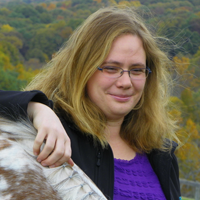As with any creative endeavor, there is a certain amount of inspiration that needs to happen in your writing: the beautiful melding of your varied experiences turned into something new and wonderful, yet familiar and accessible. The problem comes when you, as a writer, think that work can only be done when you have that perfect idea, or during a time of perfect inspiration when the words flow like honey. When it’s not easy and you get stuck, it’s labeled ‘writer’s block’ which lends itself to an ‘understood’ expectation that you need to somehow wait for the problem to solve itself.
Instead of waiting around for that perfect solution, I’m going to share with you five steps for how to learn to overcome your difficulties by creating agency in your writing life. First, you need to:
1) Accept that writing is hard
We’re not going to ease into this by any means. It is important to realize that learning to do anything well is hard, and that includes writing. You’re going to hit walls and get stuck, no exceptions. It happens to every writer, no matter where they are in their writing career, or how much success they’ve had. Now, different things will be hard for different writers at different stages, but there is no magical point where writing becomes ‘easy.’
That’s not to say writing is all bad. There are still those magical moments referenced above where everything comes together so perfectly. But there are also the times when writing is …well it’s work. And when you accept that is just part of the writing process, you are less likely to let yourself stay stuck when things get tough. So if we accept that we’re going to get stuck, then we also need to:
2) Learn to identify your stuck spots
In an oversimplification of ways you can get stuck as a writer, I narrow it down to three basic things:
- A stuck spot in your story: Something about the story/characters/plot is just not working.
- A stuck spot in your life: When your obligations are taking up all of your time.
- A stuck spot in you: This is doubt of yourself or your abilities.
It’s not always easy to tell the difference. If you’re unable to find time to sit down and write, it could be because your story isn’t working and you’re finding excuses to not sit down. OR it could also be that there’s simply too much on your plate to carve out time to write. OR there’s a possibility that you’re doubting yourself and your ability to write such that you find excuses to not write.
Other times you’ll know immediately that your main character is simply not behaving themselves, or your child has a concert coming up at school so you have no time to write. If you can identify where you’re stuck, then great. And if you can’t, then take your best guess before you:
3) Take an action
This is where, instead of waiting for the time to be right, or for everything to be perfect, or for the muse to descend, you take action and do a thing.
If you think the stuck spot is in your story, then choose an action from among your writing skills. Try an exercise to flesh out a character. Write a prompt to enrich your world. Read an article to raise awareness of your word choices. Try an outline to diagnose a pacing problem. Or there’s always one of my favorites, which is pouring out as many words as I can until I find the illusive idea I’ve been searching for to move the story forward.
If you think the stuck spot is in your life, then determine which of your daily tasks are really necessary and which ones you can get help with either by asking a spouse or friend for help, or saying no to requests from others so that you can carve out that time for yourself to write. If the interruption is temporary, then take care of life first. But if things keep getting in the way, then you need to take action to take control of your schedule.
If you think the stuck spot is in you, then it’s important to remind yourself that you don’t need to be perfect. Your writing doesn’t need to be as polished as a published piece. You’re always going to be striving for a new skill but not quite have a handle on it yet. And you’re never going to write like <favorite author here> because you are going to write like *you*.
Remind yourself of why you love writing by reading something you wrote that was good. Read a book or watch a movie that inspires you. Go out into nature and breathe in the beautiful, imperfect world.
When you’ve gotten past your stuck spot in that you’ve written more, gotten your schedule figured out, and/or you’ve gotten back your inspiration, don’t forget that you will:
4) Get stuck again
Okay, hear me out. This might seem really rough, but if you remember #1 then you know (even if you haven’t quite been able to accept yet) that writing is hard, and so you’re going to get stuck again. The problem is that a lot of people get stuck over and over and end up giving up.
“Why do we fall, Bruce? So we can learn to pick ourselves up.”
-Thomas Wayne from Batman Begins
The thing is, you won’t get stuck unless you’re striving for a goal. If you have no aspirations you won’t fail to reach them, but you also have no chance to succeed. You need to get stuck, you need to have difficulties, you need to struggle so that you can learn to do it better for the next time you:
5) Take action again
And again and again if you need to. Now this doesn’t mean to throw yourself blindly against the stuck spot. There is a point at which the action might be setting aside a particular story and trying something else for a while. The action might be going and taking a walk, or watching a movie. It might be going to a writer friend, or even a non-writer friend (gasp) and talking about where you think you might be stuck. The action could be pounding out words. It could be reading articles on writing. The important thing is to keep trying things until you figure out what you need to do in order to move forward.
Also, remember that even if a certain action got you unstuck in a similar circumstance before, that doesn’t mean it will work again the next time. Being a writer means being flexible. No two stories are written the same, so no two solutions to a stuck spot are going to be the same. You will, over time, learn certain things that work well for you, and you will learn to recognize certain stuck spots and how to fix them. Then new stuck spots will pop up and that’s okay. In fact it’s perfect, because that is how you learn.
One day you’ll look back and realize how far you’ve come as a writer because of your difficulties. And it’s all by taking action to create agency in your writing life.
What are some actions you take if you find yourself stuck on your writing?

Laura Highcove has a degree in computer science, which is obviously why she is a fantasy writer. She is influenced by anime, video games, table-top gaming, programming, horses, and Norse mythology in no particular order. She currently lives in beautiful Blacksburg, Virginia with her computer, two cats, and husband. Her psychic abilities have not yet developed, but she remains hopeful. If you’d like to learn more about her, head over to her website and sign up for her newsletter (and get a free short story) here.







